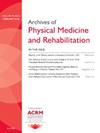Motor Skill Learning in School-Age Children Tested with a Gamified Mobile Health System
IF 3.6
2区 医学
Q1 REHABILITATION
Archives of physical medicine and rehabilitation
Pub Date : 2025-05-01
DOI:10.1016/j.apmr.2025.03.028
引用次数: 0
Abstract
Motor skills are critical to a child's physical development, academic success, and social participation. Evidence of motor skill learning requires multiple evaluations across time, posing challenges for traditional laboratory testing. Combining expertise of two labs in rehabilitation and computer science, we implemented a motor learning task within a mobile health iPad application to study unimanual and bimanual skill learning in a school environment. Twenty-five participants ages 5-8 were tested as part of an on-going study investigating differences in motor skill learning between children born preterm or at term age. Testing occurred on three separate days (Day 1, Day 2, Day 7) wherein participants performed 5 blocks (24 trials/block) of a unimanual and bimanual task using a wireless gaming remote fitted with joystick handles. The game objective was to move a visual cursor (ladybug) to a target (flower). Completion time and movement error were calculated and used to evaluate 7-day retention; comparisons were made between tasks (bimanual vs. unimanual) and age (5-6 y/o vs. 7-8 y/o). A greater proportion of 7-8 y/o children (80%) showed retention compared to 5-6 y/o children (33%) for both tasks, however, there were overall fewer children who showed retention of bimanual (19%) compared to unimanual (31%) skills. Movement errors significantly decreased at Day 7 for unimanual compared to bimanual skills (t = −3.134, p = 0.007) demonstrating better unimanual skill retention. Mobile devices may enable precise and objective data collection outside the laboratory, enabling future motor learning research in children with and without developmental disorders.
通过游戏化移动医疗系统测试学龄儿童的运动技能学习
运动技能对孩子的身体发育、学业成功和社会参与至关重要。运动技能学习的证据需要跨时间的多次评估,这对传统的实验室测试提出了挑战。结合康复和计算机科学两个实验室的专业知识,我们在移动健康iPad应用程序中实施了一个运动学习任务,以研究在学校环境下的单手和双手技能学习。作为一项正在进行的研究的一部分,25名年龄在5-8岁之间的参与者接受了测试,该研究调查了早产儿和足月龄儿童在运动技能学习方面的差异。测试分3天进行(第1天、第2天、第7天),参与者使用带有操纵杆手柄的无线游戏遥控器执行5个单元(24个单元/单元)的单手动和双手动任务。游戏目标是将视觉光标(瓢虫)移动到目标(花)上。计算完成时间和运动误差,用于评价7天的保留时间;比较了任务(手工与非手工)和年龄(5-6岁vs. 7-8岁)。与5-6岁的儿童(33%)相比,7-8岁的儿童(80%)在两项任务中表现出记忆力的比例更高,然而,与单手技能(31%)相比,表现出双手技能记忆力的儿童(19%)总体上较少。与双手技能相比,单手技能在第7天的运动误差显著减少(t = −3.134,p = 0.007),表明单手技能保留更好。移动设备可以在实验室之外进行精确和客观的数据收集,使未来有或无发育障碍儿童的运动学习研究成为可能。
本文章由计算机程序翻译,如有差异,请以英文原文为准。
求助全文
约1分钟内获得全文
求助全文
来源期刊
CiteScore
6.20
自引率
4.70%
发文量
495
审稿时长
38 days
期刊介绍:
The Archives of Physical Medicine and Rehabilitation publishes original, peer-reviewed research and clinical reports on important trends and developments in physical medicine and rehabilitation and related fields. This international journal brings researchers and clinicians authoritative information on the therapeutic utilization of physical, behavioral and pharmaceutical agents in providing comprehensive care for individuals with chronic illness and disabilities.
Archives began publication in 1920, publishes monthly, and is the official journal of the American Congress of Rehabilitation Medicine. Its papers are cited more often than any other rehabilitation journal.

 求助内容:
求助内容: 应助结果提醒方式:
应助结果提醒方式:


